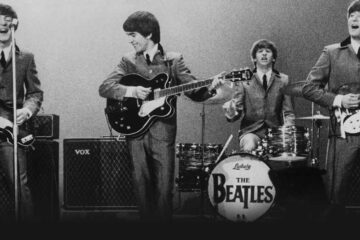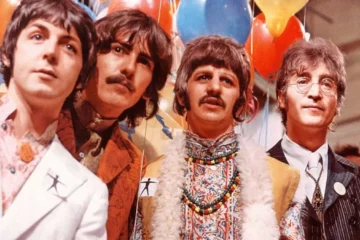1968’s self-titled album by The Beatles contains an entire menagerie of songs, from monkeys with nothing to hide doing it in the road to blackbirds singing in the dead of night and tales of raccoons from Dakota. Paul McCartney reimagined himself as ‘Mother Nature’s Son’, while John Lennon outed his former songwriting partner as “the walrus”.
No doubt, the natural surroundings of the band’s transcendental meditation retreat in Rishikesh, India, inspired their sudden interest in the animal kingdom. And George Harrison, who was becoming a skilled songwriter in his own right, was keen to get in on the act. His creature of choice wasn’t quite as exotic as Indian monkeys or walruses, though. It was the common farmyard pig.
Harrison’s song ‘Piggies’ compares the lot of “little piggies”, for whom “life is getting worse”, to the “bigger piggies” with their “starched white shirts” who spend their time “stirring up the dirt” for the smaller members of their species to roll around in. In doing so, he appears to use a metaphor to draw a class distinction between political and economic elites living lives of relative luxury and the lower classes of society, who are stirred up by the dirty political games the rich and powerful are playing.
Borrowing an expression from his mother, the song’s writer vents his disdain for these “bigger piggies”, exclaiming, “What they need’s a damn good whacking,” at the end of its penultimate verse. Disguised as a barnyard nursery rhyme for children in the tradition of The Beatles’ cod-sea shanty ‘Yellow Submarine’, ‘Piggies’ is actually a political allegory with fairly sinister undertones. Not least in the final line of its lyrics, which describes well-mannered pigs dining with their wives on “bacon”, effectively cannibalising the less fortunate inhabitants of their sty.
So, whose politics inspired Harrison?
The youngest Beatle didn’t coin this metaphor himself. Firstly, the portrayal of politicians and financiers as pigs feeding from a trough has been around in popular cartoons for hundreds of years. Even more pertinently, another of the 20th century’s great artists had already used a children’s story about a herd of pigs as a thinly veiled metaphor for social inequality.
In his 1945 novella Animal Farm, George Orwell famously wrote, “Some animals are more equal than others.” He was referring to the Stalinist Soviet Union at that time, where the inequalities of capitalism had supposedly been abolished while a caste of bureaucrats lorded their privileges over the rest of society. The pigs in Orwell’s story represent various real-life protagonists of the Russian Revolution and the Soviet bureaucracy which arose in the decade that followed it, including Stalin himself.
Harrison doesn’t seem to be referencing Russian society in particular. His attempt at a porcine parable arguably has as much to do with the class disparities he witnessed in Britain in the late 1960s. Then again, given his history of railing against government intervention in songs like ‘Think for Yourself’ and ‘Taxman’, he could well have been skewering the Soviet state.
‘Piggies’ is far from his finest effort as a songwriter for The Beatles. But it certainly gives us some food for thought. Just as long as that food isn’t bacon.




